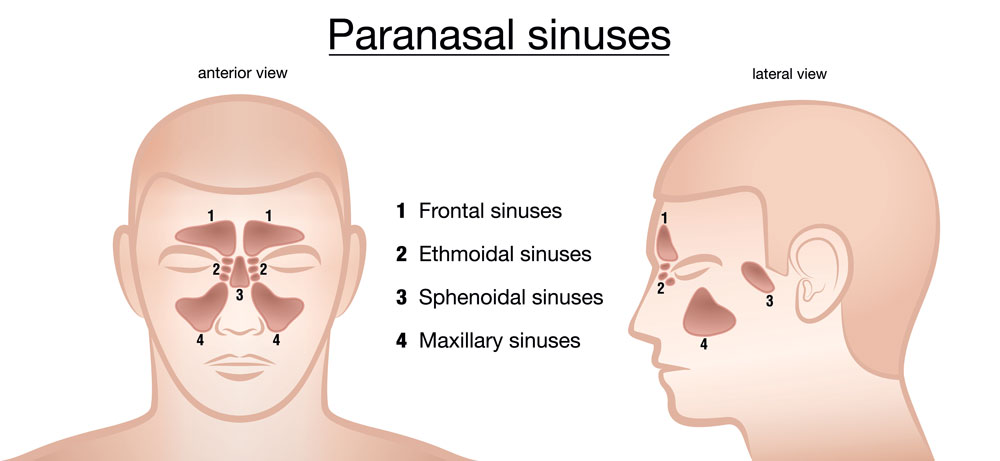
Tired of sinus infections?

According to the Centers for Disease Control and Prevention, over 29 million Americans are diagnosed with sinus infections each year. Patients can experience bothersome facial pain/pressure, nasal congestion, headaches and runny nose, among other symptoms. These symptoms are usually due to blockage of the sinus openings, resulting in infection.
We can help you look for an effective longer term solution to your sinus problems.
We begin by obtaining a detailed history and performing a thorough nasal examination, which usually includes nasal endoscopy. We may also suggest you have a CT scan of the sinuses to obtain further information. Our goal is to determine the root cause of your sinus issues.

Paranasal sinuses, simply known as sinuses, are air-filled openings surrounding your nasal cavity. Although the function of paranasal sinuses is not entirely clear, it is commonly thought that they help humidify the air we breathe. Adults have four paired sinuses: frontal, ethmoid, sphenoid and maxillary. Your symptoms may vary, based on which sinuses are infected.
Sinusitis is often broken into two major categories-acute sinusitis and chronic sinusitis, based on frequency and duration of symptoms. The diagnosis and treatment for acute and chronic sinusitis differs and is discussed below.
Acute Sinus Infection (Acute Sinusitis)
Common symptoms of acute sinusitis include facial pain/pressure, tooth pain, ear pain, nasal congestion, post-nasal drip, cough or discolored mucus. A detailed history, exam and possibly nasal endoscopy will help us confirm a diagnosis of acute sinusitis.
Acute sinusitis may be due to either a virus or bacteria. It is important to distinguish between the two in order to provide the right treatment. The “common cold” is also known as acute nasopharyngitis and is caused by a viral infection. This type of sinus infection does not require antibiotics and usually resolves within 5 days. Treatment is centered around helping patients with their symptoms and may include some combination of oral and nasal decongestants, nasal saline washes, antihistamines, nasal steroid sprays and cough medication. It is important to avoid unnecessary antibiotics for this type of sinusitis.
Bacterial sinusitis is most often due to haemophilus influenzae, moraxella catarrhalis or streptococcus pneumoniae. If your symptoms are lasting more than 5-7 days you should be evaluated for possible bacterial sinusitis. An ENT doctor can help correctly identify the infection and prescribe the most appropriate antibiotic.
Chronic/recurrent Sinusitis
Many patients suffering from chronic and recurrent sinus infections often receive multiple courses of antibiotics prescribed by either their primary care physician or urgent care center. Yet their symptoms persist or recur. They may not be aware of a more permanent solution that might be available. A nasal endoscopy and a CT scan of the sinuses will help identify possible causes of sinus obstruction including allergies, nasal polyps and deviated septum. Treatment options may include preventative strategies such as a daily nasal saline rinse, allergy treatment including possible immunotherapy, in office balloon sinuplasty and traditional sinus surgery.
Factors contributing to sinusitis
Allergies
Many patients have seasonal or year-round allergies contributing to their sinus symptoms and infections. Allergies can cause inflammation and swelling in your nose contributing to the blockage of sinus passageways. Symptoms may include itchy, runny nose, itchy, watery eyes, post-nasal drip and congestion. You may benefit from allergy testing and treatment.
Nasal polyps
Nasal polyps are soft, sac-like growths within the nose. They are commonly caused by chronic inflammation in conditions such as chronic allergies. Symptoms may include congestion or decreased ability to smell. Depending on their size and location, they may also obstruct sinus openings, leading to infection. Treatment of nasal polyps usually begins with medical therapy and may require surgical removal in some patients.
Deviated Septum
A nasal septum is a cartilaginous and bony wall which separates the left and right nasal passageways. In some people, it may be deviated to the left or right side rather than being straight and midline. This is known as a deviated nasal septum. Symptoms may include congestion and difficulty breathing through the nose. Some people may have rhinitis (a runny nose), post-nasal drip and snoring due to a deviated septum. A severely deviated septum may also contribute to obstruction of sinus drainage passageways, leading to sinus infections. Depending on the extent of the deviation, we may start with natural treatments such as saline washes or medical therapy. Correction of a deviated septum with surgery may be recommended for select patients.
Advances in management of chronic/recurrent sinusitis
Traditionally, treatment of chronic sinusitis usually begins with medical therapy including treatment of underlying allergies. If symptoms are still persistent, sinus surgery, known as functional endoscopic sinus surgery (FESS), is often recommended to open blocked sinus passages. Correction of a deviated nasal septum and nasal polyps may also be performed if needed. These procedures are typically performed in a surgical center or hospital and usually require general anesthesia.
An innovative solution to chronic sinusitis has been popularized over the past 5-10 years. This newer, minimally invasive procedure known as balloon sinuplasty can achieve similar results without surgery. Balloon sinuplasty is an in-office procedure which uses a small balloon to dilate the passages of the sinuses. It is usually performed in less than one hour with most patients returning to work either the same or the following day. You may see a video explaining the procedure by clicking on the link below.
http://www.manhattanentdoctor.com/services/balloon-sinuplasty
As you can see, sinus problems can be quite complex. If you are tired of frequent sinus infections and wish to avoid taking multiple courses of antibiotics and other medications, you should be evaluated by an ENT doctor to see what other options are available for you!
You Might Also Enjoy...


5 Tips for Managing Your Allergies During the Holidays

Is a Deviated Septum the Cause of Your Chronic Congestion?

How Your Allergies Can Change in the Winter

Why Does My Child Breathe So Loudly?

